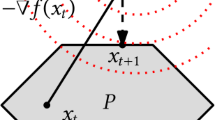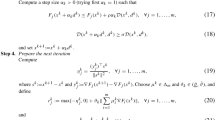Abstract
We define a new Newton-type method for the solution of constrained systems of equations and analyze in detail its properties. Under suitable conditions, that do not include differentiability or local uniqueness of solutions, the method converges locally quadratically to a solution of the system, thus filling an important gap in the existing theory. The new algorithm improves on known methods and, when particularized to KKT systems derived from optimality conditions for constrained optimization or variational inequalities, it has theoretical advantages even over methods specifically designed to solve such systems.
Similar content being viewed by others
References
Behling, R., Fischer, A.: A unified local convergence analysis of inexact constrained Levenberg-Marquardt methods. Optim. Lett. 6, 927–940 (2012)
Bonnans, J.F., Shapiro, A.: Perturbation Analysis of Optimization Problems. Springer, New York (2000)
Dan, H., Yamashita, N., Fukushima, M.: A superlinearly convergent algorithm for the monotone nonlinear complementarity problems without uniqueness and nondegeneracy conditions. Math. Oper. Res. 27, 743–753 (2002)
Dong, Y., Fischer, A.: A framework for analyzing local convergence properties with applications to proximal-point algorithms. J. Optim. Theory Appl. 131, 53–68 (2006)
Facchinei, F., Fischer, A., Herrich. M.: A family of Newton methods for nonsmooth constrained systems with nonisolated solutions. Math. Methods Oper. Res. (2012). doi:10.1007/s00186-012-0419-0
Facchinei, F., Fischer, A., Kanzow, C.: On the accurate identification of active constraints. SIAM J. Optim. 9, 14–32 (1998)
Facchinei, F., Fischer, A., Kanzow, C.: On the identification of zero variables in an interior-point framework. SIAM J. Optim. 10, 1058–1078 (2000)
Facchinei, F., Fischer, A., Kanzow, C., Peng, J.-M.: A simply constrained optimization reformulation of KKT systems arising from variational inequalities. Appl. Math. Optim. 40, 19–37 (1999)
Facchinei, F., Fischer, A., Piccialli, V.: Generalized Nash equilibrium problems and Newton methods. Math. Program. 117, 163–194 (2009)
Facchinei, F., Kanzow, C.: A nonsmooth inexact Newton method for the solution of large-scale nonlinear complementarity problems. Math. Program. 76, 493–512 (1997)
Facchinei, F., Kanzow, C.: Generalized Nash equilibrium problems. 4OR 5, 173–210 (2007)
Facchinei, F., Pang, J.-S.: Finite Dimensional Variational Inequalities and Complementarity Problems. Springer, New York (2003)
Fan, J.Y., Yuan, Y.X.: On the quadratic convergence of the Levenberg-Marquardt method without nonsingularity assumption. Computing 74, 23–39 (2005)
Fernández, D., Solodov, M.: Stabilized sequential quadratic programming for optimization and a stabilized Newton-type method for variational problems. Math. Program. 125, 47–73 (2010)
Fischer, A.: Solution of monotone complementarity problems with locally Lipschitzian functions. Math. Program. 76, 513–532 (1997)
Fischer, A.: Modified Wilson’s method for nonlinear programs with nonunique multipliers. Math. Oper. Res. 24, 699–727 (1999)
Fischer, A.: Local behavior of an iterative framework for generalized equations with nonisolated solutions. Math. Program. 94, 91–124 (2002)
Fischer, A., Shukla, P.K.: A Levenberg-Marquardt algorithm for unconstrained multicriteria optimization. Oper. Res. Lett. 36, 643–646 (2008)
Fischer, A., Shukla, P.K., Wang, M.: On the inexactness level of robust Levenberg-Marquardt methods. Optimization 59, 273–287 (2010)
Hager, W.W.: Stabilized sequential quadratic programming. Comput. Optim. Appl. 12, 253–273 (1999)
Hoffman, A.J.: On approximate solutions of systems of linear equations and inequalities. J. Res. Natl. Bur. Stand. 49, 263–265 (1952)
Izmailov, A.F., Kurennoy, A.S., Solodov, M.V.: The Josephy-Newton method for semismooth generalized equations and semismooth SQP for optimization. Set-Valued Var. Anal. 21, 17–45 (2013)
Izmailov, A.F., Solodov, M.V.: Newton-type methods for optimization problems without constraint qualifications. SIAM J. Optim. 15, 210–228 (2004)
Izmailov, A.F., Solodov, M.V.: Stabilized SQP revisited. Math. Program. 133, 93–120 (2012)
Kanzow, C.: Strictly feasible equation-based methods for mixed complementarity problems. Numer. Math. 89, 135–160 (2001)
Kanzow, C., Yamashita, N., Fukushima, M.: Levenberg-Marquardt methods with strong local convergence properties for solving equations with convex constraints. J. Comput. Appl. Math. 172, 375–397 (2004)
Klatte, D., Kummer, B.: Nonsmooth Equations in Optimization. Kluwer, Dordrecht (2002)
Kummer, B.: Newton’s method for non-differentiable functions. In: Guddat, J., et al. (eds.) Mathematical Research Advances in Mathematical Optimization, pp. 114–125. Akademie Verlag, Berlin (1988)
Luque, F.J.: Asymptotic convergence analysis of the proximal point algorithm. SIAM J. Control Optim. 22, 277–293 (1984)
Ng, K.F., Zheng, X.Y.: Error bounds of constrained quadratic functions and piecewise affine inequality systems. J. Optim. Theory Appl. 118, 601–618 (2003)
Oberlin, C., Wright, S.: Active constraint identification in nonlinear programming. SIAM J. Optim. 17, 577–605 (2006)
Qi, L.: Convergence analysis of some algorithms for solving nonsmooth equations. Math. Oper. Res. 18, 227–244 (1993)
Qi, H., Qi, L., Sun, D.: Solving Karush-Kuhn-Tucker systems via trust region and conjugate gradient methods. SIAM J. Optim. 14, 439–463 (2003)
Qi, L., Sun, J.: A nonsmooth version of Newton’s method. Math. Program. 58, 353–367 (1993)
Scholtes, S.: Introduction to Piecewise Differentiable Equations. Springer, New York (2012)
Shukla, P.K.: Levenberg-Marquardt Algorithms for Nonlinear Equations, Multi-objective Optimization and Complementarity Problems. Dissertation, Technische Universität Dresden, Dresden (2010)
Tseng, P.: Growth behavior of a class of merit functions for the nonlinear complementarity problem. J. Optim. Theory Appl. 89, 17–37 (1996)
Ulbrich, M.: Nonmonotone trust-region methods for bound-constrained semismooth equations with applications to mixed complementarity problems. SIAM J. Optim. 11, 889–917 (2001)
Wright, S.: Superlinear convergence of a stabilized SQP method to a degenerate solution. Comput. Optim. Appl. 11, 253–275 (1998)
Wright, S.: Constraint identification and algorithm stabilization for degenerate nonlinear programs. Math. Program. 95, 137–160 (2003)
Wright, S.: An algorithm for degenerate nonlinear programming with rapid local convergence. SIAM J. Optim. 15, 673–696 (2005)
Yamashita, N., Fukushima, M.: On the rate of convergence of the Levenberg-Marquardt method. Comput. [Suppl.] 15, 239–249 (2001)
Zhou, G., Qi, L.: On the convergence of an inexact Newton-type method. Oper. Res. Lett. 34, 647–652 (2006)
Acknowledgments
We wish to thank the anonymous referees for their valuable comments.
Author information
Authors and Affiliations
Corresponding author
Additional information
Part of this research was done while the second author was visiting the Department of Computer, Control, and Management Engineering Antonio Ruberti at the University of Rome La Sapienza. The financial support by the University of Rome La Sapienza is kindly acknowledged.
Rights and permissions
About this article
Cite this article
Facchinei, F., Fischer, A. & Herrich, M. An LP-Newton method: nonsmooth equations, KKT systems, and nonisolated solutions. Math. Program. 146, 1–36 (2014). https://doi.org/10.1007/s10107-013-0676-6
Received:
Accepted:
Published:
Issue Date:
DOI: https://doi.org/10.1007/s10107-013-0676-6




